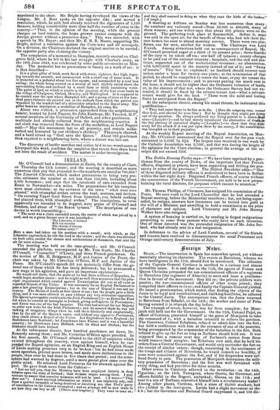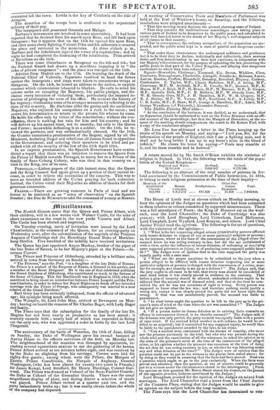gortign 24 . tbis.
&MIN.—The insurrection in Spain has somewhat spread, yet without materially altering its character. The events at Barcelona, whence we have intelligence to the 17th, should first be mentioned. The adhesion of the Captain-General Cortinez is ascribed to a curious and almost incredible cause. It is said that on the 11th, the agents of France and Queen Christina persuaded the non-commissioned officers of a regiment in Barcelona (the regiment of Almeria) to meet and issue a proclama- tion in favour of the movement : they did so ; the private soldiers were passive ; the non-commissioned officers of other corps joined ; they compelled their officers to do so ; and finally the Captain-General yielded. He issued a proclamation, which stated, that finding the objects of the Junta to be loyal and constitutional, and disliking hostilities, he adhered to the Central Junta. The consequence was, that the Junta returned. to Barcelona from Sabadel, on the 14th ; the mother and sister of Prim having entered it in triumph the day before.
The triumph of revolt, however, was far from complete ; for Mont- juich still held out for the Government. On the 13th, Colonel Pujol, an officer of Cortinez, presented himself at the gates of Montjuich to take the command of it, with a battalion intended to relieve the garrison. The Governor, Colonel Echabeau, refused to admit him into the fort ; but held a conference with him at the entrance of one of the posterns, being accompanied by the commander of the battalion in the fort. Both refused to give up the fort so long as Zurbano should bold out. It was supposed that a rumour next day of Zurbano's retreat from Rene would remove their scruples : but Echabeau now said, that he held his orders from a Central Government, and would only surrender the fort on the receipt of similar orders; though, concurring in the sentiments of the troops and citizens of Barcelona, he would commit no hostility, if none were committed against the fort, and if his despatches were suf- fered freely to pass. The possession of Montjuich determines the mili- tary possession of Barcelona ; and the fort was well furnished with every thing, and had provision for three months.
Other towns in Catalonia adhered to the revolution : on the 14tb, Figueiras ; on the 15th, Tarragona, where Osorio, the Governor, and officers faithful to the Regent, embarked ; Girona, on the 11th ; and near it a son of Zurbano converted himself into a revolutionary leader ! Among other places, Cardona, with a store of 10,000 muskets, had also yielded to the insurgents. Lerida had a slight movement on the 8.b ; but the Governor and National Guard suppressed it, and 150 dis-
contented left the town. Lerida is the key of Catalonia on the side of Arragon. The desertion of the troops here is attributed to the unpunctual delivery of their pay. The insurgents still possessed Granada and Malaga. Zarbano's movements are involved in some uncertainty. It had been reported that he desisted from his march upon Reus, and fell back upon Saragossa ; but it appears that on the 11th he opened fire upon Reus, and after some sharp fighting, Colonel Prim and his adherents evacuated the place and retreated to the mountains. At three o'clock p. m., Zurbano and the inhabitants signed the terms of a capitulation ; and by night he had completed the disarming of the inhabitants. Prim arrived at Barcelona on the 16th.
There was some disturbance at Saragossa on the 8th and 9th ; but the National Guard had drawn up a manifesto imputing it to " the echo of private vengeance " ; and the place was tranquil on the 15th.
Advices from Madrid are to the 17th. On learning the death of the Political Chief of Valencia, Espartero resolved to head the forces against the insurgents ; and steps were taken to concentrate troops at Saragossa. On the 14th, he issued an address to the nation, to explain conduct which calumniators laboured to blacken. He calls to mind his solemn oaths on accepting the Regency, his public pledges, and dis- claims every intention of violating them, particularly the imputed in- tendon of prolonging the term of his office. He reviews the history of Otis regency; vindicating some of its stronger measures by referring to the slate of the country. He disclaims alike the genius and the ambition of Napoleon, who expiated his usurpations on a rock in the ocean ; and avows his determination to return to the private life whence he came. He holds his office only by virtue of the constitution ; without the con- stitution, there is nothing but ruin for him and his country ; and he will deliver up his sacred trust, not to anarchy, but only to the Queen and Cortes ; meanwhile defending it as a soldier. On the 15th, he re- viewed the garrison, and was enthusiastically cheered. On the 16th, the Gazette contained a proclamation of the Regent, signed by all the Ministers, declaring illegal and rebellious all Juntas found in opposition to the Government, and ordering their members to be tried and pu- nished with all the severity of the law of the 17th April 1821.
In an express proclamation, the Spanish Government have contra- dicted a report that there was an intention to remove the Queen from the Palace of Madrid towards Portugal, to marry her to a Prince of the family of Saxe-Coburg Cohary, who was then in that country on a visit to the King, one of its sons.
PORTUGAL.—Lisbon papers of the 12th instant state, that the Queen and the King Consort had again given up a portion of their annual in- -come, in order to relieve the necessities of the country. This was to meet an intended address of the Cortes praying for such reduction. Instead, the Cortes voted their Majesties an address of thanks for their generous concession.
FRANCE.—There are growing rumours in Paris of land and sea forces to be stationed as an " army of observation " on the Spanish frontier ; the Due de Nemours to take the command of a camp at Rennes.



























 Previous page
Previous page